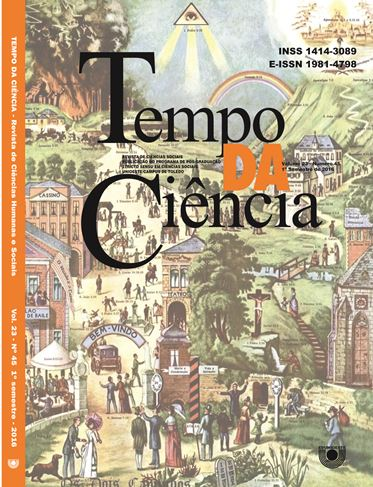CONSTRUCTION OF MODERN DEMOCRACY CONCEPT: INITIAL VERSION OF A RESEARCH PROJECT
DOI:
https://doi.org/10.48075/rtc.v23i45.14441Keywords:
Teoria democrática, conceito de democracia, democracia liberal, democracia socialista.Abstract
The need to research how the modern concept of democracy was built and how the liberal version - representative, formal, electoral and limited - became hegemonic generated a collective research project which will be developed by the Research Group Democracy and Development, bound the course of Social Sciences Unioeste campus of Toledo, in the coming years. Following the initial reflection that justified the project: after presenting the theme, we underline our theoretical framework and what the justification for a search. Our research problem unfolds in some theoretical questions: what is the difference between the classical and the modern conception of democracy? What are the essential differences between the classical Athenian democracy and modern democracy that arises in the United States and Europe with the establishment of liberal capitalism? Why, from the beginning of establishment of Western modernity, the historical forces involved in the construction of modern constitutional principles shifted the original meaning of democracy "government by the demo" to "government by the owners"? How important the development of the European labor movement had on the expansion of the modern concept of democracy beyond its liberal sense? What would be the operational concept of socialist democracy? What is your connection with the classical concept of democracy (Athenian democracy)? The overall objective is to investigate how the modern concept of democracy was formed from the beginning of Western modernity and identify the elements that distinguish the Athenian classic. In addition, we intend to investigate the historical process that led to the crystallization of the contents of the modern concept of democracy; identify and characterize the specific content of the concept of "liberal democracy"; investigate the role of the lower classes, especially the European labor movement, the democratization of liberalism and the expansion of the modern concept of democracy; identify and characterize the specific content of the concept of "socialist democracy"; identify the distinctions between the concepts of "liberal democracy" and "socialist democracy"; and, finally, to produce an operational concept of Socialist democratic, able to define the essential properties and characteristics of the various historical forms. To this end, we have adopted as a research procedure the methodology of the social history of political theory or social contextualism, which allows a reinterpretation of the classics of politics who wrote about democracy, an important step for the further development of an operational concept of socialist democracy that combines freedom with substantive equality. It is an intellectual and practical exercise that not only seeks to produce a concept of socialist democracy as well as think as people's participation in politics could be made without leaving the scope of citizenship is emptied.Downloads
Published
How to Cite
Issue
Section
License
Aviso de Direito Autoral Creative Commons
Política para Periódicos de Acesso Livre
Autores que publicam nesta revista concordam com os seguintes termos:
1. Autores mantém os direitos autorais e concedem à revista o direito de primeira publicação, com o trabalho simultaneamente licenciado sob a Licença Creative Commons Attribution que permite o compartilhamento do trabalho com reconhecimento da autoria e publicação inicial nesta revista.
2. Autores têm autorização para assumir contratos adicionais separadamente, para distribuição não-exclusiva da versão do trabalho publicada nesta revista (ex.: publicar em repositório institucional ou como capítulo de livro), com reconhecimento de autoria e publicação inicial nesta revista.
3. Autores têm permissão e são estimulados a publicar e distribuir seu trabalho online (ex.: em repositórios institucionais ou na sua página pessoal) a qualquer ponto antes ou durante o processo editorial, já que isso pode gerar alterações produtivas, bem como aumentar o impacto e a citação do trabalho publicado (Veja O Efeito do Acesso Livre).
Licença Creative Commons
Esta obra está licenciada com uma Licença Creative Commons Atribuição-NãoComercial-CompartilhaIgual 4.0 Internacional, o que permite compartilhar, copiar, distribuir, exibir, reproduzir, a totalidade ou partes desde que não tenha objetivo comercial e sejam citados os autores e a fonte.


